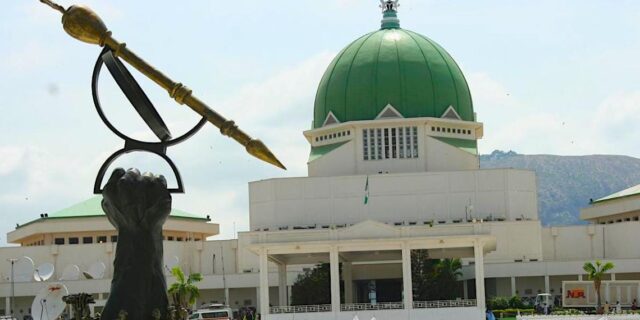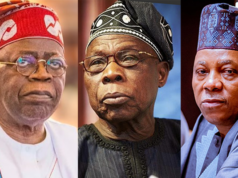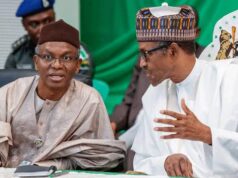
About 16 months to the end of the 9th House of Representatives, only six of the 21 members elected to the House on the platform of minor political parties in 2019 remain in those parties. The others have mostly defected to the ruling All Progressives Congress (APC), despite the 1999 Constitution frowning at lawmakers switching parties at will.
Before the carpet crossing began, members of minor parties had projected themselves as a force to be reckoned with in the House, particularly during the battle for the leadership of the minority caucus. While the Peoples Democratic Party (PDP), which is the largest minority party, nominated Kingsley Chinda (PDP, Rivers) as Minority Leader, members of the other minority parties joined forces with a rebel group in the PDP and supported Ndudi Elumelu (PDP, Delta) to clinch the position.
However, as of January 2022, the minor parties have almost entirely faded out in the House. Only six of the members are still in the minor parties, 13 have decamped to the APC, one was sacked by the court and one died. Those still loyal to the platforms on which they were elected are the four members of the All Progressives Grand Alliance (APGA), one of ADC and one of PRP.
The Labour Party, Africa Democratic Party, Social Democratic Party and Action Alliance no longer have seats in the House because of defections.
“Don’t be an interloper”
Section 68 (1g) of the 1999 Constitution provides that, “a member of the Senate or the House of Representatives shall vacate his seat in the House of which he is a member …….. if being a person whose election to the House was sponsored by a political party, he becomes a member of another political party before the expiration of the period for which that House was elected: provided that his membership of the latter political party is not as a result of a division in the political party of which he was previously a member or of a merger of two or more political parties or faction by one of which he was previously a member.”
While the above provision prohibits carpet crossing in the legislature, it also contains a lacuna that defectors are latching on to. Lawmakers often cite “division” in their parties for jumping ship.
In the 9th House, the minority leaders are hampered from even protesting defections. In February 2021, when Peter Makinde defected from ADC to the APC, Nicholas Ossai, a member of the PDP, raised a point of order, citing Section 68 of the constitution. He said Mr Makinde did not provide proof of a division in the ADC.
But in his ruling, Mr Gbajabiamila dismissed Mr Ossai as a “meddlesome interloper,” noting that since he is not a member of the ADC, he would not know if there was division in the party.
![Speaker of the House of Representatives, Femi Gbajabiamila [PHOTO CREDIT: @FemiGbajabiamila]](https://i2.wp.com/media.premiumtimesng.com/wp-content/files/2021/12/244390828_416375879858238_2729161454322152857_n.jpg?resize=960%2C640&ssl=1)
He added: “Do you know the party chairman of ADC? Do you know the name of the Chairman?”
In March 2021, Mr Gbajabimila reiterated the same argument following the defection of Jimoh Aremu of the ADC to APC. He once again called the deputy minority leader, Toby Okechukwu, a meddlesome interloper.
“Are you a member of the ADC? If the answer is no, then you are a meddlesome interloper. You are not a member of that party, so you will not know what is going on in that party,” Mr Gbajabiamila told Mr Okechukwu.
Mr Gbajabiamila often uses the argument against the Minority Leader, Mr Elumelu, to bar him from speaking for small parties when such incidences occur. But the standing rule of the House mandates the Minority Leader to speak on behalf of minority parties.
Small parties as stepping stones
However, the minor parties can be said to be reaping what they sowed. A common trend among members who won elections into the House on the platforms of those parties is that they moved there shortly before the 2019 general elections, often because they could not get the tickets of the major parties.
Consider the case of Blessing Onuh, a daughter of former Senate President David Mark, who was elected on the platform of APGA, a relatively unknown party in her state, Benue State. She had contested in the PDP primaries but was defeated by her uncle, Egli Ahubi.
Two weeks after the primary, she joined APGA and was handed the House of Representatives ticket. She proceeded to inflict on her uncle a resounding defeat at the general election. She has decamped to the APC.
![Ndudi Elumelu [Photo: Elombah]](https://i1.wp.com/media.premiumtimesng.com/wp-content/files/2019/07/Ndudi-Elumelu.jpg?resize=600%2C400&ssl=1)
Another example is the case of the two Action Alliance members of the House. In the run-up to the last general election, Imo State APC had imploded over the efforts of former Governor Rochas Okorocha for his son-law, Henry Nwosu, to succeed him as governor. After Mr Nwosu was denied the APC ticket, he decamped to AA with some followers, where Pascal Obi and Uju Kingsley were elected to the House. In the aftermath of the Supreme Court nullification of the election of Emeke Ihedioha as governor of the state, nine members of the AA in the state House of Assembly decamped to the APC and Messrs Obi and Mr Kingsley followed suit at the federal parliament. Hence, AA as a political party could be said to have been a vessel for political alignment in Imo State.
The story is similar to APM in Ogun State, where former Governor Ibikunle Amosun’s anointed candidate, Adekunle Akinlade, defected to APM after he failed to clinch the APC governorship ticket. Mr Akinlade was defeated at the poll. However, APM got a seat in the House through Kolawole Lawal of Yewa South/Ipokia Federal Constituency of Ogun State. Mr Lawal had served under Mr Amosun as Commissioner for Forestry. In 2020, he returned to the APC, alongside seven APM members of the Ogun State House of Assembly.
Registration requirements to blame for trend?
Section 225A of the 1999 Constitution mandates INEC to deregister political parties that fail to register impact at the elections by winning a minimum number of seats.

“The commission has the power to deregister political parties on the breach of any of the requirements for the registration of a political party, failure to win at least 25 per cent of votes cast in one state of the federation, in a presidential election, or 25 per cent of votes in one local government area in a governorship election and failure to win at least one ward in a chairmanship election, one seat in the National or State Assembly election or one seat in a councillorship election.”
In line with that provision, INEC, after the 2019 general elections, deregistered 75 political parties. The fear of the axe of deregistration falling on them thus also encourages political parties to offer their tickets to defectors from the major parties that they think can win elections.
Political entrepreneurship
Jubrin Ibrahim, a Professor of Political Science, said inequality in resources between the two major parties (APC and PDP) and the others is behind the failure of the small parties to meet the basic requirements for staying afloat.
However, he also noted that some of the small parties are set up by “political entrepreneurs” to attract wealthy politicians.
“We have a political system where two parties are the major parties that have all the resources in the political space, while the rest are at the bottom of the heap, struggling for survival. Those struggling for survival are ready to welcome anybody if you can give them some resources because they don’t have any. Some of them are set up by political entrepreneurs, hoping they can attract rich people to their parties, and get some of the money off them. So that is the reality for the political party system we run and I think it is very difficult to change at this point,” Mr Ibrahim said.

Bidi Farouq, also a lecturer of political science, at the University of Abuja, agreed with Mr Jibrin. He said most of the so-called small parties are “merchant platforms” that are ready to sell to the highest bidders, both to meet INEC’s basic qualifications and enrich themselves.
“They don’t have standing. They sell candidacy like merchants to anyone willing to pay. At the end of the day, they are merchants, not political parties. They are briefcase parties, available to anybody to purchase,” he said.
But Julius Abure, the chairman of Labour Party, absolved the parties of blame. He said parties have to accept candidates that are available to them. Rather than blaming the political parties, he said, the laws that allow elected people to defect should be reviewed.
“If you have no aspirant for a particular office, and somebody comes from another party and he says he wants to run—and you see the capacity to win the election, it is obvious that you will give the ticket to the person. The main challenge is that law that created the loophole. If the laws are made to protect multiparty democracy, it will be difficult for those persons to decamp like that. I will therefore not put the blame on the political parties. Rather, those defectors and the laws that created the loopholes in the first place,” Mr Abure said.
Absence of Ideology
Others have blamed the lack of political ideology for the movement of politicians across parties. Unlike in many countries, most of the parties in Nigeria have no distinctive ideological identities. In pre-independence Nigeria and the First Republic, the three main parties, the Action Group, the Northern Peoples Congress (NPC) and the National Congress for Nigerian Citizens (NCNC) had ethnic or regional leaning.
READ ALSO: Two Reps defect to APC
While the current two major parties national in outlook, carpet crossing remains a regular occurrence.
Mr Farouq said the dearth of ideology could be traced to the policy of the Ibrahim Babangida military regime that abolished the ideological division of “left and right” or communism, socialism and capitalism for the formation of political parties.
“During military rule, especially under IBB, it was deliberately decided that we should not have an international ideology. International ideologies should not determine how parties and the state are run. We should work in between the ideologies, and find a common course for Nigeria. And in doing so, we did chapter two of our constitution of the needs and requirements for Nigeria. In doing so, we established the dos and don’ts for Nigeria. We decided in our laws that every political party should derive its ideology from that chapter two of the constitution. Hence, INEC will not register you if you say you are a communist or capitalist, or whatever. They will only register you if you conform to the principles of Chapter two of the constitution.”
This argument was also raised by Mr Abure. He stressed that political parties base their manifestoes on Chapter Two of the 1999 Constitution, which explains the lack of difference in the parties.
However, Mr Jibrin disagreed with the argument that Chapter Two of the 1999 Constitution is responsible for the lack of distinction among the parties. According to him, political parties in the Second Republic also derived their manifestos from a similar provision in the 1979 Constitution, but still established ideals that were distinctive among the political parties.
“Political parties in Nigeria have a narrow focus, they are conceived as platforms to get to powers. They don’t have any ideological colouration, they don’t have any programmatic platform you can identify them with. The last time we had parties you can identify ideologically or programmatically was in the Second Republic. Since then, there has been no difference between the parties.
“In 2011, I did a research on political parties. I visited generals-secretary of 11 political parties, and I asked them what was the ideology of their parties, what did they stand for? None of them could answer me off the cuff. They said you have to come back, I have to check what the party document says. If a general secretary of a political party cannot say off the cuff what they stand for, then it means they don’t stand for anything.
“That provision was there during the Second Republic and yet, within the fundamentals of state principle, that is chapter two of the constitution. When you look at the Second Republic, for instance, UPN had a focus on education; that is their programmatic priority. NPN had a focus on housing, PRP had a focus on talakawa (the poor). Within the constitutional arrangement, you can still focus on what is it that you stand for, and that is what we don’t have today. Yes, I know the constitution says they must derive their ideological platform from chapter two, but that does not mean they cannot have specificity,” Mr Ibrahim said.
Mr Abure of the Labour Party said a bill is before the National Assembly to amend section 68 of the constitution to prohibit carpet crossing. But PREMIUM TIMES found no such bill before either of the two chambers.
One thing is certain, though. With another general election around the corner, politicians will start moving across political parties, and the small parties will be eager to accept them to avoid deregistration or to enjoy slices of their resources.








